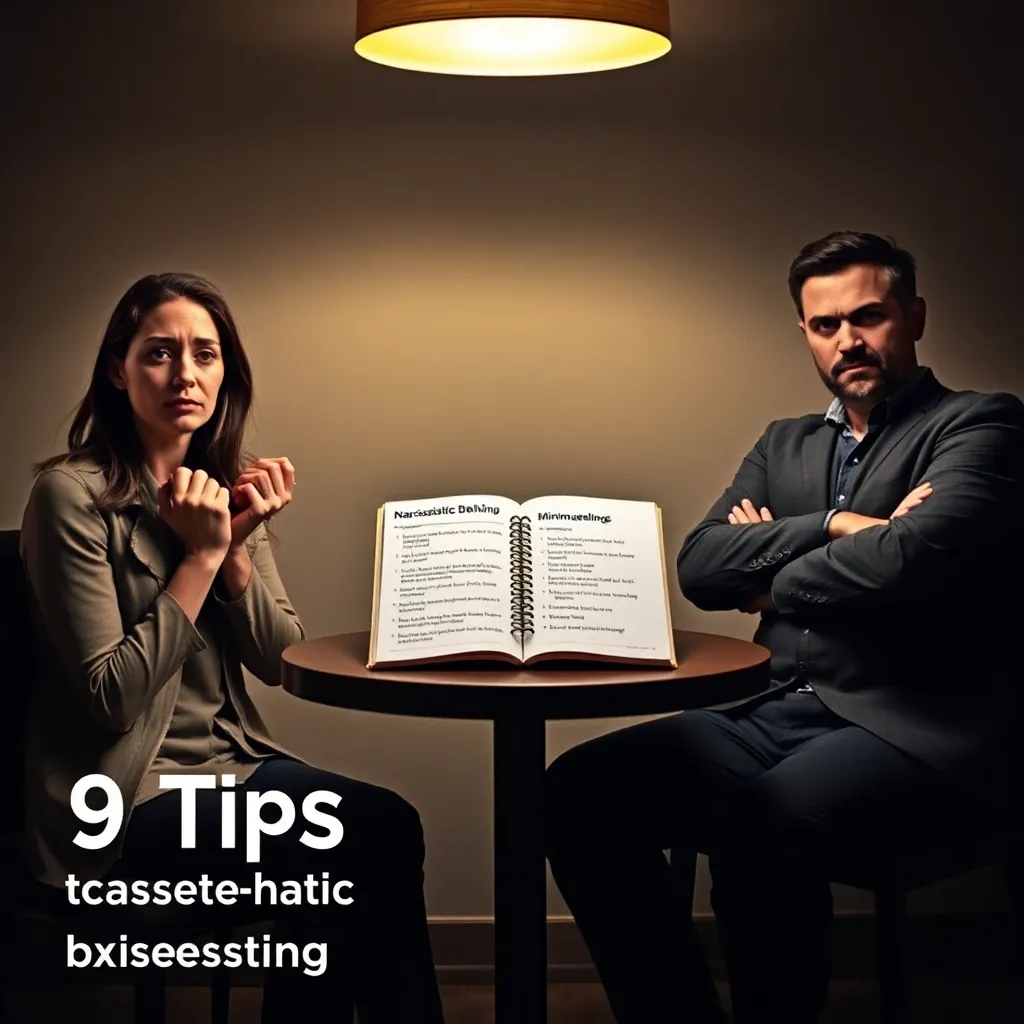Navigating relationships can be a complex and often daunting task, especially when you find yourself questioning the nature of your partner’s behavior. If you’ve ever felt confused or hurt by someone who seems to prioritize their needs over yours, you’re not alone. It’s crucial to recognize the subtle signs of narcissistic abuse, which can be deeply damaging yet difficult to pinpoint. By understanding these signs, you can protect your emotional well-being and make informed decisions about your relationship.
Narcissistic abuse can manifest in ways that leave you feeling powerless, yet it often remains hidden behind a façade of charm and charisma. Recognizing these patterns is not only empowering but essential for your mental health and future happiness. In this article, we will delve into nine key indicators of narcissistic behavior, providing clarity and guidance in what might feel like a bewildering situation. You deserve to feel safe and respected in your relationships, and identifying these signs is the first step toward reclaiming your sense of self.
Each tip is designed to help you better understand the dynamics at play, offering practical advice on how to address and navigate these challenging interactions. We aim to equip you with the tools necessary to spot narcissistic tendencies early, ensuring you’re prepared to take action when needed. As you read through this guide, remember that you’re taking a courageous step toward understanding and healing. Your journey toward healthier relationships begins with knowledge, and we’re here to support you every step of the way.
1. Recognize Excessive Self-Centeredness

In many relationships, it’s natural for partners to occasionally put their own needs first. However, when you notice a pattern of excessive self-centeredness, it may be a red flag for narcissistic abuse. Imagine a scenario where your partner consistently demands attention and praise but rarely reciprocates. This could be a sign that their self-centered behavior is overshadowing the relationship dynamics.
One common manifestation of narcissistic tendencies is a lack of empathy towards your feelings or needs. For instance, if you share an achievement or a problem and your partner swiftly shifts the conversation back to themselves, it’s a cue to pay attention to. Experts suggest that a narcissist’s inability to engage in meaningful two-way communication can leave you feeling isolated and undervalued.
To address this, it’s crucial to set clear boundaries and communicate your needs openly. You might say, “I feel unheard when our conversations focus mostly on you; can we try to balance that?” This approach helps in establishing a healthier dynamic and encourages your partner to engage more thoughtfully.
Another effective strategy is to observe how they react when you assert yourself. If they become defensive or dismissive, it could be indicative of their deep-rooted self-centeredness. Recognizing these behaviors early can empower you to make informed decisions about the future of your relationship. Knowing when to seek external support or professional advice can be transformative in navigating these complex interactions.
2. Identify Gaslighting Tactics

Gaslighting is a subtle yet powerful form of emotional manipulation that can leave you questioning your own reality. In a relationship where gaslighting occurs, a narcissistic partner may deliberately distort facts or deny events, leaving you feeling confused and disoriented. For example, they might insist you said something you never did, causing you to second-guess your memory.
It’s crucial to be aware of common gaslighting tactics such as blatant denial or shifting blame. When your partner dismisses your feelings as overreactions or insists you are the one at fault, it can create a sense of self-doubt. This can gradually erode your confidence and make you feel increasingly dependent on their version of reality.
To counteract these tactics, trust your instincts and keep a record of events as you perceive them. Writing down incidents and conversations can help affirm your sense of reality. This practice can provide clarity and serve as a reassuring anchor when you feel uncertain.
Consider discussing these experiences with a trusted friend or therapist, who can offer an external perspective. Having someone else validate your experiences can be incredibly empowering and assist in maintaining your mental health. When you’re in doubt, an external opinion can be the lifeline you need.
Understanding and identifying gaslighting tactics can help you reclaim your sense of self. By staying grounded in your reality, you can build resilience against this form of manipulation. Always remember, a healthy relationship should bolster your confidence, not undermine it.
3. Notice Lack of Empathy

In relationships, a lack of empathy can be a subtle but powerful indication of narcissistic abuse. You might find that your partner is indifferent to your emotions or struggles, leaving you feeling unsupported and alone in moments of need. For instance, if you share a significant personal achievement or a distressing event, and the response you receive is dismissive or self-centered, this could be a red flag. Such behavior can eventually undermine your self-esteem and sense of worth.
Empathy is the cornerstone of any healthy relationship, fostering trust and mutual respect. Without it, you might notice that your concerns are minimized or your partner consistently shifts the focus back to themselves. This lack of consideration can manifest in various ways, such as them interrupting you during conversations to redirect attention or trivializing your feelings. It’s crucial to acknowledge these patterns and understand that they can be emotionally damaging over time.
Narcissists often struggle to genuinely connect with others’ emotions, which can make you feel like you’re constantly walking on eggshells. When you express feelings of hurt or disappointment, a narcissistic partner might respond with anger or defensiveness instead of understanding. This can create a cycle where you begin to doubt your own emotions and experiences. Recognizing this behavior is essential for protecting your emotional well-being and establishing healthier relationship dynamics.
To navigate this complex situation, it can be helpful to keep a journal documenting instances where you felt a lack of empathy. This can offer clarity and validation, helping you decide whether to address the issue directly or seek external support. Remember, a relationship should be a partnership where both individuals feel valued and heard. By identifying a lack of empathy, you take a crucial step towards ensuring your emotional health is prioritized.
4. Spot Manipulative Behaviors

One of the most telling signs of narcissistic abuse is the presence of manipulative behaviors that can leave you feeling confused and unsure of yourself. These behaviors often manifest in subtle ways, such as when someone twists your words or actions to make you doubt your own reality.
Imagine a scenario where you’re consistently blamed for things that aren’t your fault, leaving you wondering if you’re the one being unreasonable. This is a classic example of gaslighting, a tactic often used by narcissists to maintain power and control in a relationship.
Another manipulative behavior to watch for is the use of emotional baiting. This occurs when a partner deliberately provokes you into an emotional reaction and then criticizes you for being too sensitive or irrational, leaving you feeling trapped in a no-win situation.
In some cases, a narcissistic partner may employ love-bombing followed by sudden withdrawal of affection as a way to keep you off balance. This inconsistency can create a cycle of dependency, where you find yourself constantly seeking the approval and validation that was once freely given.
Recognizing these manipulative behaviors early can empower you to set boundaries and seek healthier interactions. By staying aware and informed, you can protect yourself from the emotional turmoil often associated with narcissistic abuse.
5. Acknowledge Blame Shifting

Shifting blame is a subtle yet powerful tactic often employed in narcissistic abuse. When things go wrong, a narcissistic partner might never accept responsibility, instead, they artfully redirect the fault back onto you. Imagine being late due to unavoidable circumstances, only to find yourself accused of being irresponsible or uncaring. This constant blame-shifting can erode your confidence and make you second guess your actions, even when you’ve done nothing wrong.
In these situations, it might feel like you’re walking on eggshells, constantly trying to avoid their blaming wrath. Recognizing this pattern is crucial; it helps you see the dynamics at play and realize that the blame is not yours to carry. Taking a step back and evaluating the situation objectively can help break this cycle. Lean on trusted friends or a therapist to discuss these patterns and gain clarity.
Experts emphasize the importance of maintaining your own sense of reality and self-worth. When a partner tries to rewrite history or make you doubt your perceptions, it’s vital to trust your instincts and remember your truth. Keep a journal of events and how they made you feel; this can be a helpful tool for validating your experiences and standing firm in your understanding of events.
Ultimately, acknowledging and addressing blame-shifting can empower you to reclaim your narrative. It’s about recognizing that the blame is a tool of manipulation, not a reflection of your actions. By taking proactive steps to protect your mental and emotional health, you can foster a healthier dynamic or make informed decisions about your relationship’s future.
6. Observe Control Attempts

One of the subtle yet telling signs of narcissistic behavior is the attempt to exert control over you. This might manifest as making decisions on your behalf without consulting you or questioning your choices. Imagine a scenario where your partner insists on selecting all your clothes because they believe they know what suits you best. Such actions can seem caring at first but often reveal a deeper need to dominate aspects of your life.
It is important to recognize these control attempts early on to protect your autonomy. An individual might use manipulation techniques such as guilt-tripping or gaslighting to sway your decisions. For instance, they might say, “If you really loved me, you would do this,” to pressure you into compliance. By understanding these tactics, you can better safeguard your independence and set healthy boundaries.
Experts suggest that a partner who frequently undermines your ability to make decisions is likely prioritizing their own needs over yours. This control can extend to various areas, such as finances or social interactions, often leaving you feeling isolated. When you feel your choices are being invalidated or your voice is consistently unheard, it’s a signal to reassess the dynamics at play.
Developing a strong sense of self is crucial when dealing with such dynamics. If you find your decisions are constantly overridden, it’s vital to re-establish your boundaries and communicate them firmly. Understanding that love should empower rather than restrict can guide you towards healthier relationship choices. Ultimately, preserving your own sense of agency is essential for a fulfilling and balanced partnership.
7. Detect Constant Criticism

In many relationships, experiencing occasional criticism is natural, but when it becomes a constant feature, it’s time to take notice. Narcissistic partners often use relentless criticism as a tool to undermine your self-esteem, leaving you doubting your own worth. Imagine a scenario where your partner consistently finds fault in your actions, from how you cook to the way you laugh. This isn’t about constructive feedback; it’s about controlling your sense of self.
Expert insights suggest that narcissists employ criticism as a means of establishing dominance. Dr. Emily Scott, a psychologist specializing in relationship dynamics, explains that this behavior is often a reflection of their own insecurities. By making you feel inadequate, a narcissistic partner can maintain the illusion of superiority. It’s essential to recognize this pattern and understand that it’s more about their issues than your shortcomings.
To counter this, start by setting clear boundaries and acknowledging your own strengths. Focus on building your self-confidence by surrounding yourself with supportive friends and engaging in activities that uplift you. When criticism feels overwhelming, take a step back and assess whether it’s constructive or meant to belittle. If it’s the latter, calmly express your feelings and establish that such behavior is unacceptable.
It’s crucial to remember that you deserve respect and encouragement in your relationships. Consistent criticism is not a reflection of your worth but rather a tactic used to control. By recognizing and addressing this behavior, you can take proactive steps towards a healthier, more balanced relationship dynamic.
8. Monitor Emotional Withdrawal

Feeling an unexplained sense of *emotional withdrawal* is often a red flag in relationships. When a partner consistently *retreats emotionally* following disagreements or difficult conversations, it may signal a deeper issue of *narcissistic behavior*. This withdrawal can leave you feeling lonely and confused, questioning your own worth.
Consider the scenario where your partner seems *distant* after you voice a concern, leaving you in a vacuum of silence. This is a common tactic in *narcissistic abuse*, used to manipulate your emotions and regain control. Over time, such behavior can erode your self-esteem, making you doubt your feelings and perspectives.
To counteract this, it’s crucial to *recognize the pattern* and address it directly. Open a conversation about how their *emotional distance* affects you and the relationship. Doing so can sometimes break the cycle, but if met with *defensiveness* or further withdrawal, it might be time to seek external support.
It’s important to remember that consistently feeling emotionally abandoned is not a normal or healthy part of a relationship. Healthy relationships are built on mutual *support and understanding*, not isolation or emotional games. By monitoring and addressing emotional withdrawal, you take a significant step towards safeguarding your emotional well-being.
9. Evaluate Boundary Violations

Boundary violations are often subtle but powerful indicators of narcissistic abuse. When someone repeatedly dismisses or undermines your personal boundaries, it signals a lack of respect for your autonomy.
Imagine sharing a personal story with a partner only to have it used against you later. This type of behavior not only violates trust but also demonstrates a manipulative tactic aimed at controlling your emotional responses.
In healthy relationships, boundaries are respected and valued. Partners should work to understand each other’s limits and actively choose to honor them, fostering a sense of safety and mutual respect.
Experts suggest that persistent boundary violations are a red flag that shouldn’t be ignored. By recognizing these patterns early, you can take steps to protect yourself and reclaim your space.
Always remember that boundaries are a crucial part of any healthy relationship. Evaluating how your partner responds to your boundaries can uncover deeper truths about the nature of your relationship and guide you towards healthier interactions.
Conclusion: Creating Beautiful Outdoor Spaces
As we wrap up our exploration of the subtle yet impactful signs of narcissistic abuse, it’s essential to revisit the nine key concepts that can empower you in recognizing and addressing this behavior. From identifying patterns of manipulation and gaslighting to understanding the dynamics of control and emotional neglect, each tip serves as a beacon of awareness. Recognizing the signs of excessive criticism, boundary violations, and the cycle of idealization and devaluation can further equip you to protect your emotional well-being. By fostering self-awareness and seeking support, you build resilience against these toxic dynamics.
Your actionable next step is to reflect on your relationships, noting any signs that resonate with these concepts, and consider discussing your observations with a trusted friend or therapist. This small step could be the catalyst for profound personal growth and healthier connections.
Remember, knowledge is your ally. Bookmark this article now as a valuable resource for future reference. With this information at your fingertips, you’re better prepared to nurture relationships grounded in respect and mutual care. As you move forward, embrace the journey toward relationship success, fortified by awareness and empowered to cultivate connections that thrive.
